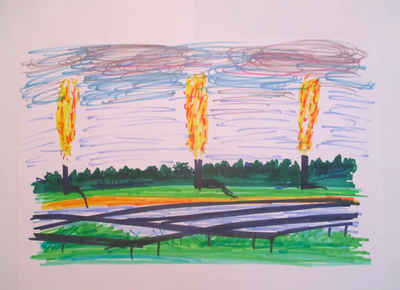Green Taxation


https://www.facebook.com/greenlibdems/posts/3943109962373531The Role of Tax and Subsidy in Tackling the Climate Emergency
The role of taxation, in particular, as a tool in dealing with the climate emergency has been deliberately overlooked by governments afraid of being punished at the ballot box for any extra taxes. I believe that the electorate is now sufficiently aware of the likely effects of climate change that there will be an acceptance of extra taxation as long as there is transparency in the destination of the extra taxation. The extra taxation must be destined for subsidies for home insulation and electric cars and other greenhouse gas saving measures, as well as for mitigation measures such as flood defences and research and development of renewable energies, energy storage and carbon capture and storage and hydrogen manufacture from non-carbon sources.
Road Transport
The taxation of petrol and diesel fuel has remained flat for several years, despite the fact that there has been a law in place to ensure that the tax is increased in excess of the rate of inflation each year. I think this law should be adhered to and not dismissed in every budget, and there may be a case for increases over and above those in the current legislation.
There should be increased subsidies to rural bus services to mitigate the effect of increased taxes on rural communities. These subsidies will have to be very substantial in the early years because it will take some time to lure people away from private cars and on to public transport
Residential Energy Use
It seems perverse that VAT of 5% is levied on greenhouse gas emitting natural gas and 20% on other purchases which are not, directly greenhouse gas emitting. The same is true of the 5% rate on electricity, although to a lesser extent, as a significant proportion of electricity is still produced from carbon fuels. In fact, the difference in taxation is not as great as appears at first sight as there is an "environmental levy" in gas and electricity bills that approximates to the equivalent of an extra 10% on VAT. Nevertheless there is a case for a higher taxation rate in order to curtail demand and encourage investment in insulation and other energy saving measures.
The question of the taxation of wood, coal and other solid fuels must be raised because, in addition to their greenhouse gas emissions, they are significant sources of air pollution. As they are generally secondary sources of energy, the solution may be in phasing them out over a period, rather than increased taxation.
It will be necessary to protect poorer households from any extra taxation. This could be done by raising the Minimum Wage and State benefits or, alternatively, each household could be allowed a tranche of gas and electricity at a lower tax rate.
Industrial Energy Use
Industry is a difficult market when it comes to taxation because there is little point in taxing British industry if it just drives production to a lower tax areas of the world. This would not reduce overall greenhouse gas emissions, but would probably increase them by increasing the distance the goods have to be shipped and, therefore, increase the necessary fuel use. Any increases in taxes would have to be co-ordinated with similar measures in other countries, at least on a regional basis and, preferably, with all of the major industrialised nations.
There has been an attempt to curb industrial energy use by the issue of carbon credits. This is a somewhat arbitrary mechanism and the market for carbon credits does not appear to be working very well and is open to abuse. I am of the view that it should be wound down over time and replaced with direct taxation.
Agricultural Greenhouse Gas Emissions
The use of fuel "red diesel" in agriculture accounts for over 15% of all diesel fuel but is taxed at less than one-fifth of the rate of road vehicles. This cannot be justified in the context of the need to reduce greenhouse gas emissions dramatically. While a part of the tax on road diesel could be viewed as a proxy for road-pricing, a significant part could be viewed as a tax on greenhouse gas emissions. There is, therefore, a strong case for a rise in tax on "red diesel" in order to give an incentive to curb use and the consequent emissions.
Aircraft Fuel
At present there a system of passenger tax, varying with class of ticket, which acts as a proxy for a tax on fuel. It is difficult for a single country to impose a tax because the airlines would react by filling their fuel tanks prior to flying to the UK. As this would result in extra weight and extra fuel, this would, perversely, result in greater greenhouse gas emissions and have the opposite effect to that intended. Any such tax, therefore, would require international agreement, at least on a regional basis.
Maritime Fuel
Any tax on maritime fuel would also need to be tackled by international agreement. It may be that the maritime industry could be persuaded to switch to less polluting fuels such as LNG (liquefied natural gas), although it may seem perverse to subsidise a greenhouse gas producing fuel.
The Plan
The intention should be to produce a plan that, although having distant goals, has year by year targets to be met in order to reach those distant goals. Having set the initial level of taxes and subsidies, these should be reviewed year by year to make sure that the plan is on track. If possible, changes in taxes and subsidies should be kept low so that those taking decisions on relevant investments can be confident in the decisions they make.
I have tried to be comprehensive but I recognise that there are uses for hydrocarbons that I have not covered, in particular their use other than for energy purposes.
John Huggins


Please join our Facebook Discussion of this article
From GLD Challenge Magazine 2019-20
